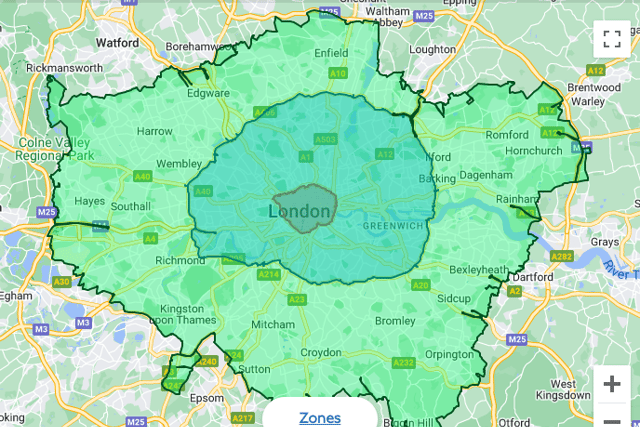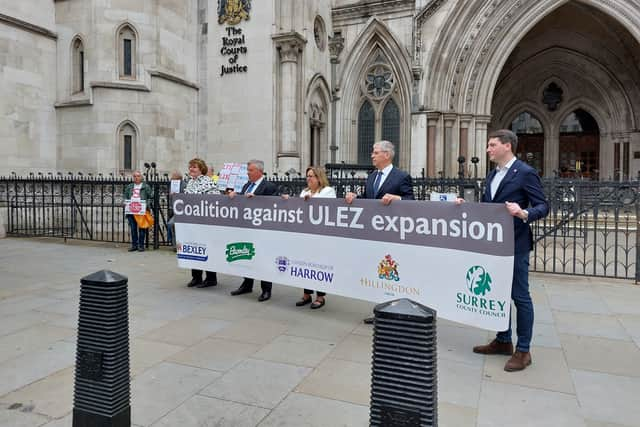ULEZ judicial review: Consultation ‘not sufficiently clear’ with lack of data behind key claim, court told
and live on Freeview channel 276
Sadiq Khan’s Ultra-Low Emission Zone (ULEZ) lacks the legal basis to expand to outer London and involved an “unintelligible” consultation, the High Court was told on Tuesday (July 4).
The mayor’s planned expansion of the zone to outer London faced its first day in court, as five Conservative councils - Hillingdon, Bexley, Bromley, Harrow and Surrey - attempt to halt it.
Advertisement
Hide AdAdvertisement
Hide AdCurrently stretching to the North and South Circular roads, the expansion will mean most drivers of non-compliant vehicles in all of the capital’s 33 boroughs will be liable to pay a £12.50 daily charge from August 29.
Mr Khan and Transport for London (TfL) argue the expansion is necessary to clean up London’s air, though others decry it as a tax-grab, which will have little impact on pollution levels.
Ahead of the court date, a spokesperson for Mr Khan said the mayor “will robustly defend his vital action to expand the ULEZ in court while continuing with preparations for expansion at the end of August”.
Speaking outside court, Susan Hall, one of two remaining Tory hopefuls to take on Mr Khan at next year’s mayoral election, told LondonWorld: “At the end of the day the consultation we believe was flawed, the way he’s brought it in is incorrect, and beyond that, many of us, those of us receiving numerous, hundreds and hundreds of emails from local people, local Londoners know that it’s not wanted, it’s not needed because it won’t improve air quality, and therefore it should be stopped.”
Advertisement
Hide AdAdvertisement
Hide Ad

‘Significant’ change to ULEZ
The three challenges being heard in court over the next two days relate to a failure to comply with the correct statutory requirements, with the scheme to have been launched as a separate legal entity rather than a variation of the current one; that it was unlawful due to consultation materials being unclear; and that it was unlawful due to a lack of consideration of the inclusion of non-Londoners in the scrappage scheme.
In documents submitted ahead of the hearing, the councils claim the variations to the original Low Emission Zone (LEZ), first introduced under Ken Livingstone in 2007, represent “significant” changes to the scheme.
They argue it would be “surprising if the statute allowed such a significant scheme to be introduced by way of a variation order”, and so a whole new entity should have been created from scratch in order to justify the planned expansion to cover all of greater London.
Craig Howell Williams KC, representing the five councils, told the court there had been “one variation on another variation on another variation”, saying: “The original order is becoming obscured.”
Advertisement
Hide AdAdvertisement
Hide Ad‘Unintelligible’ consultation
The councils’ challenge to the consultation was also heard in court on Tuesday, claiming the process was “unintelligible” for consultees.
Central to this, the councils argue, is the claim in the consultation that 91% of vehicles were forecast as being compliant by the August 29 introductory date.
They say this figure was provided without sufficient data and that consultees were not told how it was calculated.


Mr Williams said the data behind the claim was not “sufficiently clear”, telling the court: “The consultation must be fair, not be confused, not be misleading, must be clear, must disclose relevant information.”
Advertisement
Hide AdAdvertisement
Hide AdHe continued: “One wants to know where that 91% outer London figure came from, how was it arrived at? And in this impenetrable data, there’s no reference to it.”
It has now been revealed that data from 106 cameras was used to reach the figure.
In their skeleton argument submitted to the court, the mayor and TfL, noted as an interested party, said consultees were provided “more than sufficient information to enable an intelligent response”. The submission revealed that data from 106 ANPR (automatic number plate recognition) cameras was used to inform the 91% compliance rate claim.
The hearing, before Mr Justice Swift, is to continue on Wednesday, with a judgement expected in the coming weeks.
Comment Guidelines
National World encourages reader discussion on our stories. User feedback, insights and back-and-forth exchanges add a rich layer of context to reporting. Please review our Community Guidelines before commenting.
